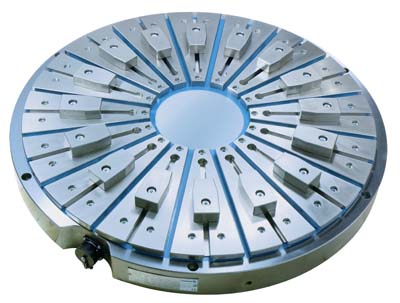Magnos
Magnos
For exact machining of thin-walled rings on rotary tables, cylindrical grinding machines, and lathes, Schunk Inc. now offers a vast program of standardized magnetic chucks with radial pole pitch.

For exact machining of thin-walled rings on rotary tables, cylindrical grinding machines, and lathes, Schunk Inc. now offers a vast program of standardized magnetic chucks with radial pole pitch. MAGNOS radial pole plates work with electrically activated permanent magnets and are proven for hard and finish turning, as well as grinding and rough machining. The workpiece can be machined from three sides without a changeover and since the magnetic field is active up to the outer fringe areas, extremely large workpieces can now be clamped securely and deformation-free. Due to the two-dimensional acting holding force, vibrations are greatly reduced during machining. This prevents the cutting edges of the tools from damage and improves the surface quality of the workpiece. Depending on the individual application, three different sizes of standardized radial pole plates are offered. For grinding operations, an AlNiCo single magnet system with automatic demagnetization, for turning operations, an AlNiCo double magnet system with high holding forces. The third one is for demanding volume machining during rough turning, an extra strong AlNiCo neodymium magnet system.





